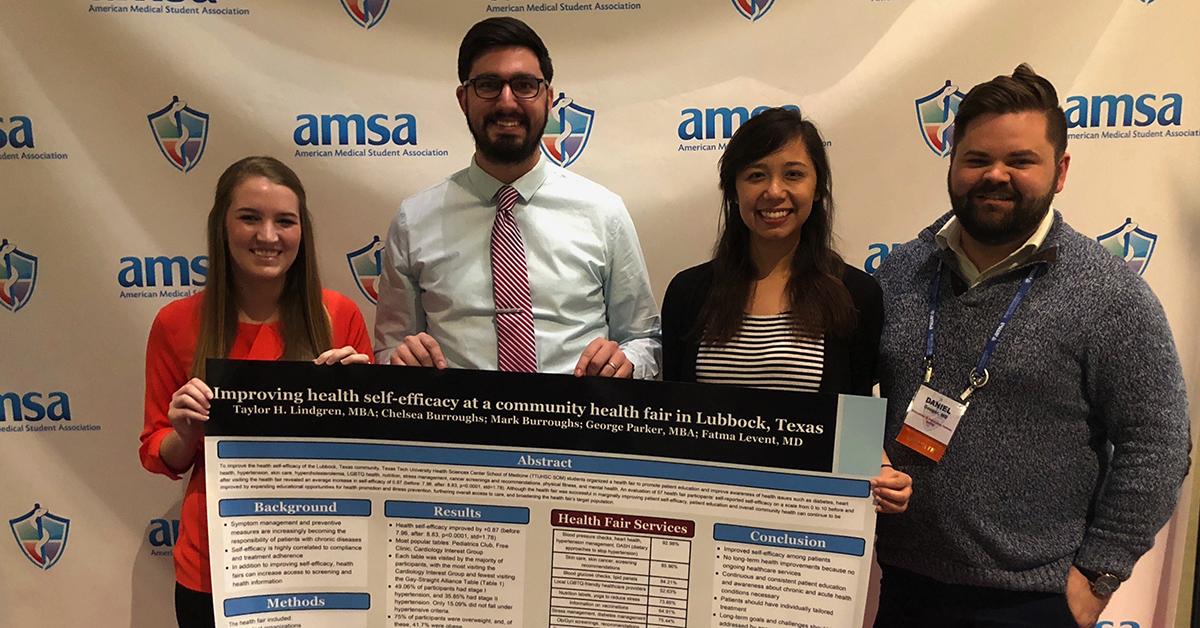Medical Students Look Deeper Into Impact of Health Fairs
Research Receives First Place at National Conference

Health fairs promote community health and provide the opportunity to bring health screenings and resources to those who attend. But recently, three medical students approached a health fair from a different perspective.
Last year Mark Burroughs, Chelsea Burroughs and Taylor Lindgren, now all third-year medical students, were officers of the local chapter of the Student National Medical Association (SNMA) at the Texas Tech University Health Sciences Center (TTUHSC). One of their organization’s yearly events is a health fair. The three students added a research component to the event by gathering information from the participants to see how they help with health self efficacy.
“We used the health fair as a platform for those seeking health care that is free or affordable,” said Mark. “We asked them after the health fair, who did you visit at the health fair and how good do you feel about maintaining your health before and then after. We found a slight difference, which was statistically significant.”
The research, “Health Fairs Improving Health Self-efficacy at a Community Health Fair in Lubbock, Texas,” was presented at the American Medical Student Association in Washington, D.C. in March and placed first among the research presentations in the category of Best Community Service.
“The research shows that by better targeting what the community needs, we can increase the self-efficacy by 0.87.” Mark said. “An important angle was that not all health fair participants were from Lubbock but also from surrounding smaller areas that have high uninsured rates, which we hoped to reach out to as well.”
The students hope to add to future health fair surveys two questions. Were you able to attend last year? How has your health efficacy improved from last year?
“By expanding on the questions, we also will be able to advocate for these patients that normally don’t have somewhere to go,” Mark said. “Hopefully we can see other institutions utilize these surveys to figure out what is needed in other community and tailoring health fairs into those needs. We definitely are excited about the
implications this research can have. By allowing people to be more informed about their own health, hopefully they will make lifestyle changes to improve their health.”
Related Stories
Celebrating Veterans: TTUHSC’s General Martin Clay’s Legacy of Service and Leadership
From his initial enlistment in the Army National Guard 36 years ago to his leadership in military and civilian health care management roles, Major General Martin Clay’s career has been shaped by adaptability, mission focus and service to others.
Texas Tech University Health Sciences Center School of Nursing Named Best Accelerated Bachelor of Science in Nursing Program in Texas
The TTUHSC School of Nursing Accelerated Bachelor of Science in Nursing (BSN) program has been ranked the No. 1 accelerated nursing program in Texas by RegisteredNursing.org.
TTUHSC Names New Regional Dean for the School of Nursing
Louise Rice, DNP, RN, has been named regional dean of the TTUHSC School of Nursing on the Amarillo campus.
Recent Stories
The John Wayne Cancer Foundation Surgical Oncology Fellowship Program at Texas Tech University Health Sciences Center Announced
TTUHSC is collaborating with the John Wayne Cancer Foundation and has established the Big Cure Endowment, which supports the university’s efforts to reduce cancer incidence and increase survivability of people in rural and underserved areas.
TTUHSC Receives $1 Million Gift from Amarillo National Bank to Expand and Enhance Pediatric Care in the Panhandle
TTUHSC School of Medicine leaders accepted a $1 million philanthropic gift from Amarillo National Bank on Tuesday (Feb. 10), marking a transformational investment in pediatric care for the Texas Panhandle.
Texas Tech University Health Sciences Center Permian Basin Announces Pediatric Residency Program Gift
TTUHSC Permian Basin, along with the Permian Strategic Partnership and the Scharbauer Foundation, Feb. 5 announced a gift that will fund a new pediatric residency.
